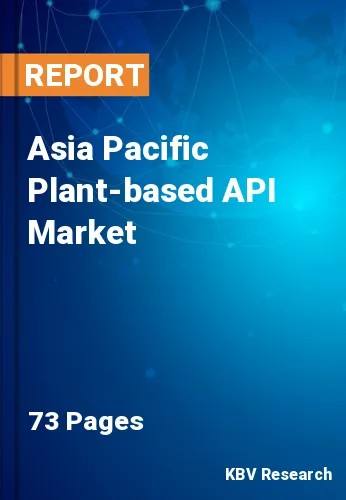The Asia Pacific Plant-based API Market would witness market growth of 6.7% CAGR during the forecast period (2023-2030).
Plant-based APIs are proving to be better than synthetic APIs. It is necessary to screen a large number of expression cassettes to find appropriate regulatory elements (such as promoters) that attain substantial amounts of product accumulation, a variety of product candidates to identify the most active and most amenable to manufacturing in plants, and sub-cellular compartment that ensures product integrity. Plants have a significant advantage in this regard because they can test a variety of potential products and expression cassettes simultaneously by simply injecting or infiltrating leaf sections with the help of a panel of Agrobacterium tumefaciens clones that contain each variant cassette as a component of the transferred DNA (T-DNA) in a binary transformation vector.
Since this process doesn't need transfection reagents, sterile conditions, or trained personnel, it can be carried out in any normal biosafety level 1 (BSL 1) laboratory anywhere in the region. This offers ease of production and allows many nations to develop their pharmaceutical industries.
The region has an expanding pharmaceutical sector. According to IBEF, the Indian pharmaceutical sector is anticipated to grow to $65 billion by 2024 and $130 billion by 2030. Currently, India's pharmaceutical business is about $50 billion. Over 200+ nations are covered by Indian pharmaceutical exports, making India a significant global supplier of pharmaceuticals. The average industrial production index for manufacturing medicines, medicinal chemicals, and botanical goods in 2021–2022 is 221.6, up 1.3% over the previous year. Compared to $24.44 billion in 2020–21, the export of pharmaceutical and medical products was $24.6 billion in 2021–22. Therefore, with the exponential development of the regional pharmaceutical industries, the market will have multiple growth opportunities.
The China market dominated the Asia Pacific Plant-based API Market by Country in 2022, and would continue to be a dominant market till 2030; thereby, achieving a market value of $3,561.9 million by 2030. The Japan market is experiencing a CAGR of 6.1% during (2023 - 2030). Additionally, The India market would showcase a CAGR of 7.4% during (2023 - 2030).
Based on End-use, the market is segmented into Pharmaceuticals, Nutraceuticals, and Herbal Based Industries & Others. Based on Molecule Type, the market is segmented into Alkaloids, Anthocyanin, Flavonoids, Phenolic Acids, Lignin & Stilbenes, Terpenoids, and Others. Based on countries, the market is segmented into China, Japan, India, South Korea, Singapore, Malaysia, and Rest of Asia Pacific.
Free Valuable Insights: The Worldwide Plant-based API Market is Projected to reach USD 42.6 Billion by 2030, at a CAGR of 5.8%
The market research report covers the analysis of key stake holders of the market. Key companies profiled in the report include BASF SE, Evonik Industries AG (RAG-Stiftung), Cargill, Incorporated, Roquette Freres SA, Arboris, LLC, Centroflora Group, Kothari Phytochemicals & Industries Ltd., Brains Bioceutical Corp., Indo Phytochem Pharmaceuticals and HimPharm.
By End-use
By Molecule Type
By Country
Our team of dedicated experts can provide you with attractive expansion opportunities for your business.

